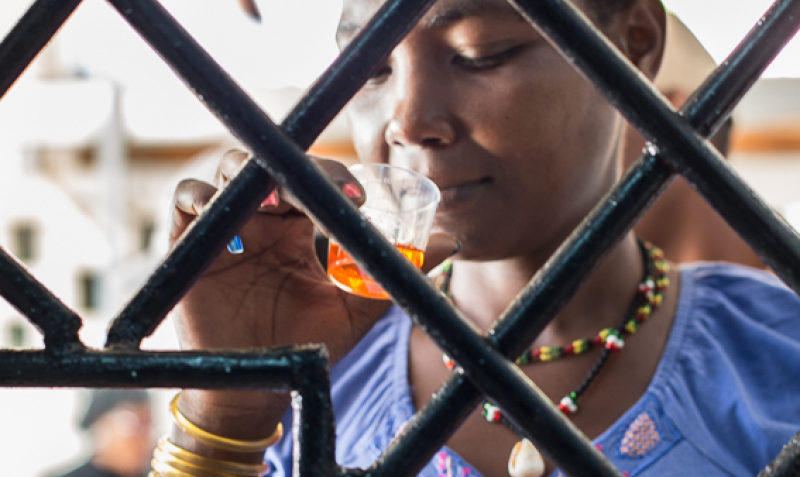Securing a better future for people in Eastern Africa who use drugs
 © Corrie Wingate for Frontline AIDS
© Corrie Wingate for Frontline AIDS
KANCO's Apondi Bernice Auma on the first ever Eastern Africa Harm Reduction Conference
Apondi Bernice Auma works on harm reduction for the Kenya AIDS NGO Consortium (KANCO)
The first Eastern Africa Harm Reduction Conference is taking place in Nairobi, Kenya this month (26 February to 1 March). Hosted by KANCO and partners, the conference will highlight the progress that has been made on harm reduction in the region, and discuss the next steps in enabling more people who use drugs to claim their right to health.
Out of the region’s population of about 150 million, some 260,000 people are reported to use drugs. HIV infection rates are disproportionately severe among this group, with HIV prevalence estimated to be up to six times higher among people who use drugs than the general population.
Now, more than ever, Eastern Africa needs to be taking an approach to drug use that reduces its harm, through the provision of clean needles and syringes and opioid substitution therapy, rather than continuing to punish people for their drug use.
Yet the commitment from most Eastern African governments to increase access to health services for people who use drugs has been minimal or none existent. Even those health systems in the region that are beginning to respond to the challenges of drug use face huge legal and policy challenges, and lack reliable data to inform services.
Drug use is something most high-level policy makers in the region see as entirely criminal. Drug policies tend to focus on supply reduction and law enforcement, and are blind to the public health reality that people who use drugs are a vulnerable group and have overlapping relationships with other key populations and the general population. In Kenya, for example, although HIV-related discrimination is prohibited, national legislation and policy fail to offer legal protection for people who use drugs.
Changing attitudes
Since 2015, the HIV and Harm Reduction in Eastern Africa Project, funded by the Global Fund to Fight AIDS, Tuberculosis and Malaria and implemented by KANCO, has seen a consortium of organisations working to expand the demand for harm reduction in Eastern Africa. Effective policy responses to drug use is one of the major outcomes envisioned by the project.
The project has led to a more collaborative approach to changing the perceptions and attitudes of policy makers towards people who use drugs. Through this process, civil society is helping to create a voice for communities of people who use drugs in Eastern Africa. We have seen how this can contribute significantly to attitude reversals among policy makers.
Progress
Modest harm reduction services now exist in Kenya, Tanzania and Zanzibar. Among people who have been able to access these services we are seeing improving health and social outcomes. But in each of these countries, despite governments revising guidelines in order to allow for harm reduction, we still hear of people who use drugs being arrested while trying to access services.
In Burundi, Uganda and Ethiopia, the criminalisation of injecting equipment has continually affected service delivery, resulting in minimal healthcare services for people who use drugs. But gains are slowly being made.
For example, in September 2017, the Ugandan Ministry of Health authorised the pilot of harm reduction services in five referral district hospitals across the country. However, this came with no commitment to review the country’s policy on service delivery for people who use drugs, despite emerging evidence of a significant population, with 1,000 people who inject drugs in Kampala alone.
Like other Eastern Africa countries, Uganda has mainly maintained a criminal justice approach. This singular view, along with a lack of data, has created a ‘hidden’ population that is rarely seen, heard or listened to by policy makers across the region. We hope the first Eastern Africa Conference on Harm Reduction will be another turning point in bringing about more effective policy responses.
A regional policy on harm reduction?
In recognition that demand reduction and supply suppression approaches are failing, in May 2016, KANCO, together with community groups and health experts from across Eastern Africa, began formulating a regional policy on harm reduction services for people who use drugs.
It remains to be seen if Eastern Africa Community member states will adopt the recommendations in the document. If they do, Eastern Africa will be the first region on the continent to agree an effective, public health response to drug use.
Such a comprehensive regional policy would encourage governments in Eastern Africa to review and update their national laws in ways that create an enabling environment for harm reduction.
This would go a long way to create awareness and harmonise drug policies in the region, and ultimately secure a better future for people who use drugs, and the region’s HIV response.
For more information on the Eastern Africa Harm Reduction Conference visit www.eahrconference.com
This article was written as the International HIV/AIDS Alliance, before we changed our name to Frontline AIDS.
Tags
EthiopiaHarm reductionKenyaTanzaniaUganda


